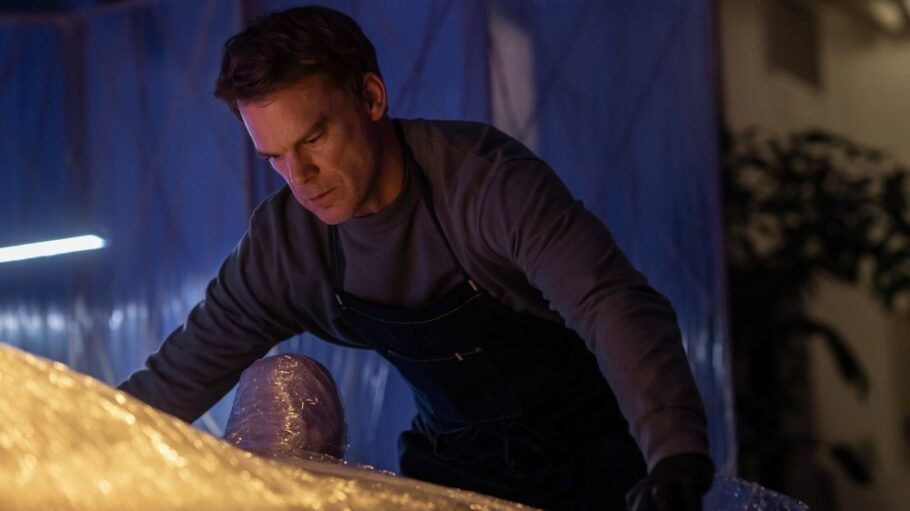There’s a morbid symmetry to how the “Dexter” franchise limps along as its parent company, too, becomes a shell of its former self. Showtime, once a premium cable competitor to HBO, now lives on largely as a sub-brand of a streaming service while Paramount Global grovels before the Trump administration to complete its own sale. Meanwhile, “Dexter” approaches its 20th year on its third spinoff, bringing its namesake antihero back from the dead for yet another bite at the apple. The whole situation is as grimly amusing as “Dexter” used to be in its prime.
The first “Dexter” sequel, “New Blood,” at least countered the cynicism of so many revivals by seeming to give the story a definitive end: with Dexter being shot by his own teenage son, Harrison (Jack Alcott), both breaking and perpetuating a generational cycle of violence. But three years later, “Original Sin” arrived, a redundant prequel that also undid the marginal contributions of “New Blood” by revealing Dexter survived, then framing its events as a mid-surgery flashback. (Creatively barren as it was, “Original Sin” was successful enough to earn a second season renewal.) Now, “Resurrection” follows the serial killer to New York City, where he attempts to watch over Harrison from afar while re-establishing his routine of finding — and murdering — fellow psychopaths.
At first, “Resurrection” seems to set up a baton-passing from Dexter to Harrison, now working as a valet at a Midtown hotel. Harrison may have (violently!) rejected his father’s lifestyle, but when a high-rolling hotel guest reveals himself to be a sexual predator, the younger Morgan follows in Dexter’s homicidal footsteps. Yet Harrison isn’t the true focus of “Resurrection,” at least in the four episodes provided to critics. Dexter is, and Harrison’s struggles to cover his tracks and come to terms with the family legacy take a literal backseat to the title character’s new life as a rideshare driver. “Resurrection,” like the previous spinoffs, is overseen by “Dexter” showrunner Clyde Phillips, but as Dexter gets taken under the wing of a friendly family of Sierra Leonean immigrants who rent him their basement, it’s hard to shake the feeling we’re watching a higher-budget form of fanfiction.
Despite the change in scenery, Michael C. Hall isn’t the only familiar face. David Zayas returns as Dexter’s old Miami PD colleague Angel Batista, who’s slightly less jovial now that he’s realized his friend may have had good reason to fake his own death, and Dexter still has visions of his father Harry (James Remar). While Dexter and Harry have their umpteenth debate over the so-called “code” they devised to put Dexter’s bloodlust to more productive ends, it’s hard not to wonder why “Resurrection” didn’t simply invert the device and have Dexter’s ghost appear to Harrison as he navigates life on his own. That setup, at least, could’ve kept Hall around while moving the franchise forward.
But to move forward, you have to want to move forward, and what “Resurrection” wants is to get back to old tricks. Soon, Dexter is back on the trail of another killer, this one targeting his fellow gig workers for the UrCar app — earning him the sobriquet “Dark Passenger,” which is exactly what Dexter always called his inner demons. There are doubles everywhere you look in “Resurrection”: the premiere includes a speed-run version of the near-deathbed hallucinations that form the entirety of “Original Sin,” while Dexter makes repeated jokes about how strange it is to be the one on the operating, or acupuncture, table for once. We get them the first time.
The storyline that comes closest to the perverse glee of original “Dexter,” not just its literal contents, also features the most overqualified cast. Peter Dinklage, chewing scenery like it’s gum, plays a venture capitalist whose wealth turns him into a true-crime fan on steroids, identifying serial killers and collecting them like objects. (The killers themselves are played, in the most outright enjoyable of the early episodes, by a slew of well-known guests, from Neil Patrick Harris to Krysten Ritter.) No less an icon than Uma Thurman plays the billionaire’s lethal enforcer. She’s just as much in nostalgia mode as Hall is, back in the role of ultra-competent killer for hire she acted so well in “Kill Bill,” but deployed sparingly enough that the high doesn’t wear off.
The same can’t be said of the rest of “Resurrection.” The pivot from icy upstate to the bustling city, like the move from South Florida to the Northeast before it, can’t provide the fresh start most relocations are chasing. Nor can the cat-and-mouse game between Harrison, played by Alcott with sweet yet bland naïveté, and Claudette (Kadia Saraf), the amusingly blunt detective on his trail. Whatever hints of freshness there are to “Resurrection,” they’re overpowered by the inescapable stench of the old. Per the title, “Resurrection” is an attempt to bring Dexter, and “Dexter,” back to life. It makes a better case the character’s better off where he was.
Love Film & TV?
Get your daily dose of everything happening in music, film and TV in Australia and abroad.
The first two episodes of “Dexter: Resurrection” are now streaming on Paramount+ with Showtime, with remaining episodes debuting weekly on Fridays.
From Variety US































